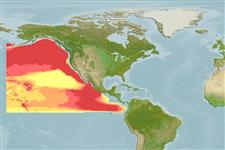分類 / Names
俗名 | 同種異名 | Catalog of Fishes(屬, 種) | ITIS | CoL | WoRMS | Cloffa
Teleostei >
Lophiiformes (Anglerfishes)
鮟鱇目 (Anglerfishes) >
Gigantactinidae (Whipnose anglers)
大角鮟鱇科 (Whipnose anglers)
Etymology: Gigantactis: Greek, 'gigas' or 'gigantos' = gigantic + Greek, 'aktis' = ray (referring to the unusually long first dorsal-fin spine that functions as a lure in this genus) (Ref. 86949).
Eponymy: Dr Jay Mathers Savage (d: 1928) is an American herpetologist and educator who is known particularly for his work on the herpetofauna of Central America. [...] (Ref. 128868), visit book page.
Environment: milieu / climate zone / depth range / distribution range
生態學
海洋 深海區的; 深度上下限 700 - 1250 m (Ref. 86949). 深水域
Pacific Ocean.
中太平洋東部: Cortez 岸堤。
大小 / 重量 / 年齡
Maturity: Lm ? range ? - ? cm
Max length : 15.0 cm SL (female)
簡短描述
檢索表 | 型態特徵 | 形態測量圖
背棘 (總數) : 0; 背的軟條 (總數) : 4 - 6; 臀棘: 0; 臀鰭軟條: 4 - 6. Length of illicium 165-273% SL; distal prolongation of esca tapering to a point, bearing 10-18 long, unpaired distal appendages (Ref. 41361); escal papillae absent; proximal escal papillae absent; short dentary teeth (longest 1.7-2.1% SL), arranged posteriorly in two or three longitudinal series; length of caudal fin rays less than 35% SL; weakly developed skin coverage of proximal part of caudal fin; caudal fin rays free nearly to base (Ref. 86949).
誘餌的長度 165-273% SL; 餌球的末梢部延伸漸漸變細成一個尖點, 生長著 10-18個長的, 不成對的末梢部的附肢.(參考文獻 41361)
Known from 6 specimens (Ref. 41361).
已知來自 6件標本了。 (參考文獻 41361)
Life cycle and mating behavior
成熟度 | 繁殖 | 產卵場 | 卵 | 孕卵數 | 仔魚
中太平洋東部: Cortez 岸堤。
Bertelsen, E. and T.W. Pietsch, 2002. New species of deep-sea anglerfish of the genus Gigantactis (Lophiiformes: Gigantactinidae) from the western North Atlantic Ocean. Copeia 2002(4):958-961. (Ref. 41361)
IUCN 瀕危狀態 (Ref. 130435: Version 2024-2)
無危 (LC) ; Date assessed: 11 October 2018
人類使用
漁業: 沒有興趣
工具
特別的報告
下載 XML
網路資源
Estimates based on models
Preferred temperature (Ref.
123201): 1.5 - 2.1, mean 1.8 °C (based on 2260 cells).
Phylogenetic diversity index (Ref.
82804): PD
50 = 0.5000 [Uniqueness, from 0.5 = low to 2.0 = high].
Bayesian length-weight: a=0.01995 (0.00906 - 0.04395), b=3.01 (2.83 - 3.19), in cm total length, based on all LWR estimates for this body shape (Ref.
93245).
營養階層 (Ref.
69278): 3.9 ±0.7 se; based on size and trophs of closest relatives
Fishing Vulnerability (Ref.
59153): Low vulnerability (10 of 100).
